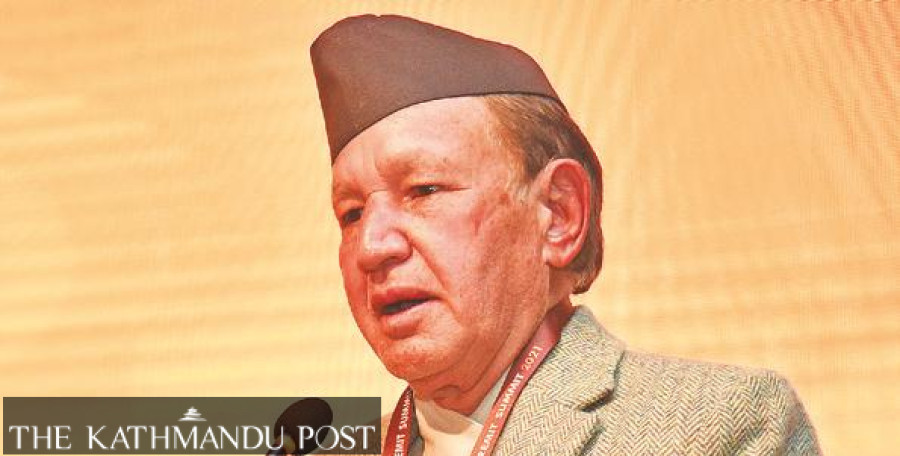Politics
Khadka set to visit China as Nepal says following developments in Taiwan
This will be first high-level visit to China since Sher Bahadur Deuba became prime minister in July last year.
Anil Giri
The Ministry of Foreign Affairs on Friday announced Foreign Minister Narayan Khadka’s visit to China as it said it is closely following the developments in the Taiwan Strait in the wake of US House Speaker Nancy Pelosi’s visit to the self-ruled island earlier this week which has led Beijing to make retaliatory moves.
Though the invitation was extended on July 29, the government was undecided on the visit until Thursday as tensions flared between China and the United States over Taiwan soon after Pelosi left Taipei.
In a statement, the Foreign Ministry said Khadka will pay a three-day visit to China from August 9-11 at the invitation of Chinese State Councillor and Foreign Minister Wang Yi.
This will be the first high-level visit from Nepal to China since the formation of the current Sher Bahadur Deuba government in July last year.
Officials said that a few rounds of consultations have already been held with the line ministries in order to finalise the agenda of the visit as well as the matters to take up with China.
During the visit, the Nepali side is expected to push for an understanding with China on the grant announced during the visit of Chinese President Xi Jinping in 2019, officials said.
President Xi, during his meeting with President Bidya Devi Bhandari in October 2019, had pledged Rs56 billion to expedite some infrastructure projects selected by Nepal.
“Once we sign the grant agreement, we will select the projects and start technical and financial negotiations with China,” a Finance Ministry official said.
There is no specific agenda for the visit, a Foreign Ministry official said. “In line with Wang’s visit to Nepal in March, we will continue talks on various matters including trade, commerce, border and boundary, and review the status of the Chinese-funded projects and discuss pushing projects under the Belt and Road Initiative.”
The two ministers [Khadka and Wang] will hold bilateral talks, leading their respective delegations on August 10 in Qingdao, according to a statement by the Foreign Ministry.
Khadka’s visit to China follows two back-to-back visits from China in March and July—by Foreign Minister Wang and Liu Jianchao, head of the international department of the Chinese Communist Party.
In Beijing, Chinese Foreign Ministry spokesperson Hua Chunying said that China and Nepal are good neighbours, good friends and good partners.
“Nepal Foreign Minister Khadka’s visit to China is a return visit to State Councillor and Foreign Minister Wang Yi's visit to Nepal in March. The foreign ministers of the two countries exchanged visits in less than half a year, which reflects the mutual trust and friendship between China and Nepal,” Hua said during a regular press briefing on Friday.
“The Chinese side looks forward to further strengthening strategic communication with the Nepali side through this visit, firmly supporting each other, and promoting the continuous development and prosperity of the China-Nepalese strategic partnership of friendship for generations.”
The visit is taking place days after the Chinese ambassador to Nepal, Hou Yanqi, issued a statement in Kathmandu over Pelosi’s visit to Taiwan, calling it a serious violation of the one-China principle and hailing Nepal’s commitment to one-China policy.
“We believe that Nepal will continue to abide by the one-China principle and understand and support China’s legitimate and justified position and work together with China to defend each other’s sovereignty, security and territorial integrity,” Hou said in the statement.
On Friday, Sewa Lamsal, the Foreign Ministry spokesperson, at a regular press briefing, reiterated Nepal’s commitment to one-China policy, adding that Nepal is closely following the developments in the Taiwan Strait.
“Since Nepal is a peace-loving country, we stand for world peace,” said Lamsal. “Both Nepal and China support each other's sovereignty, territorial integrity and independence. We are committed to the one-China policy.”
China considers Taiwan as part of its territory and has condemned the US official’s visit to the island as a violation of the one-China principle. China has continued to fire missiles into the waters surrounding Taiwan.
Earlier on Friday, Home Minister Bal Krishna Khand conveyed to Chinese Ambassador Hou that Nepal is committed to the one-China policy and will not allow its soil to be used against its neighbours.
Khand and Hou discussed the latest situation in the Taiwan Strait and possible Chinese assistance for disaster preparedness in Nepal, according to Khand’s private secretariat.
Both the US and China have been Nepal’s long-time friends with decades of diplomatic ties. However, in recent times both seem to have attempted to make a renewed push for their engagements with Nepal, as Kathmandu risks falling into a geopolitical quagmire should it fail to tread carefully, experts say.
In February, Beijing had warned Washington against “coercive diplomacy” in Nepal as politicians in Kathmandu debated over parliamentary ratification of the Millennium Challenge Corporation compact, a $500 million US grant. Nepal ratified the grant agreement in February-end. A month later, Chinese Foreign Minister Wang visited Kathmandu.
Since the MCC compact ratification, there has been a flurry of visits from the United States to Nepal, with the recent one by Assistant Secretary of State Donald Lu on July 28.
In May, US Under Secretary for civilian security, democracy, human rights Uzra Zeya during her visit to Nepal made rounds of some Tibetan camps in Kathmandu and held talks with Tibetan refugee leaders, something about which Beijing has always been sensitive. Zeya is also the special coordinator for Tibetan issues of the Biden administration.
Tanka Karki, former Nepali ambassador to China, said that Nepal should be careful about possible ramifications as the global order is shaking.
“We have to reap maximum benefits from our immediate neighbours but at the same time we cannot undermine the West,” said Karki, adding, “Since a new kind of tension and confrontation has emerged between stable and rising forces, we have to tread carefully.”
“The old global order is on the verge of tipping over and there is a struggle going on to create a new global order. What is most important now is we have to take maximum benefit from India and China, winning their confidence by not playing one against the other. We should stick to the non-alignment and other stated policies,” said Karki.
As a reciprocal visit from Nepal to the United States, Prime Minister Sher Bahadur Deuba’s trip to Washington was also being considered for mid-July but according to sources it was put on hold “for the time being”.
Though an invitation was extended in April, controversy erupted over Nepal’s participation in the US government's State Partnership Program, with politicians from across the political spectrum calling on the Deuba government not to be part of any military and security alliance. Coalition partners advised Deuba to put the visit on hold.
Hours before meeting with Lu on July 29, Foreign Minister Khadka told Parliament that Nepal wrote to the US government on July 25, stating that it won’t be part of the SPP.
The SPP was not on the agenda during Lu’s meetings with Deuba and Khadka.
There has not been any bilateral visit by a sitting prime minister to the United States in two decades since 2002 when Deuba as then prime minister had flown to Washington.




 12.47°C Kathmandu
12.47°C Kathmandu















